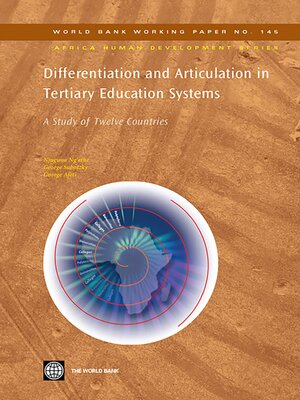Differentiation and Articulation in Tertiary Education Systems
ebook ∣ A Study of Twelve Countries · Africa Human Development Series
By Njuguna Ng'ethe

Sign up to save your library
With an OverDrive account, you can save your favorite libraries for at-a-glance information about availability. Find out more about OverDrive accounts.
Find this title in Libby, the library reading app by OverDrive.



Search for a digital library with this title
Title found at these libraries:
| Library Name | Distance |
|---|---|
| Loading... |
This paper explores an area of tertiary education that is currently understudied—the extent and nature of differentiation and articulation in African tertiary education systems. The overall finding of the study is that a binary system is dominant, characterized by universities and polytechnics as distinct types of institutions. Differentiation is clearly evident in Africa, though mostly horizontal as opposed to vertical. Articulation, on the other hand, seems to be in its infancy, as some universities, in their admission requirements, do not recognize polytechnic qualifications, and mobility between similar institution types is rare. National policy, market forces, institutional reforms, industry, and regional initiatives drive differentiation. Resource constraints, isomorphism, governance and funding structures, and the absence of debate over size and shape act as inhibitors. Demand for access appears to be the only driver for articulation, while national policies, internal governance structures, and industry/labor market inhibit growth.







